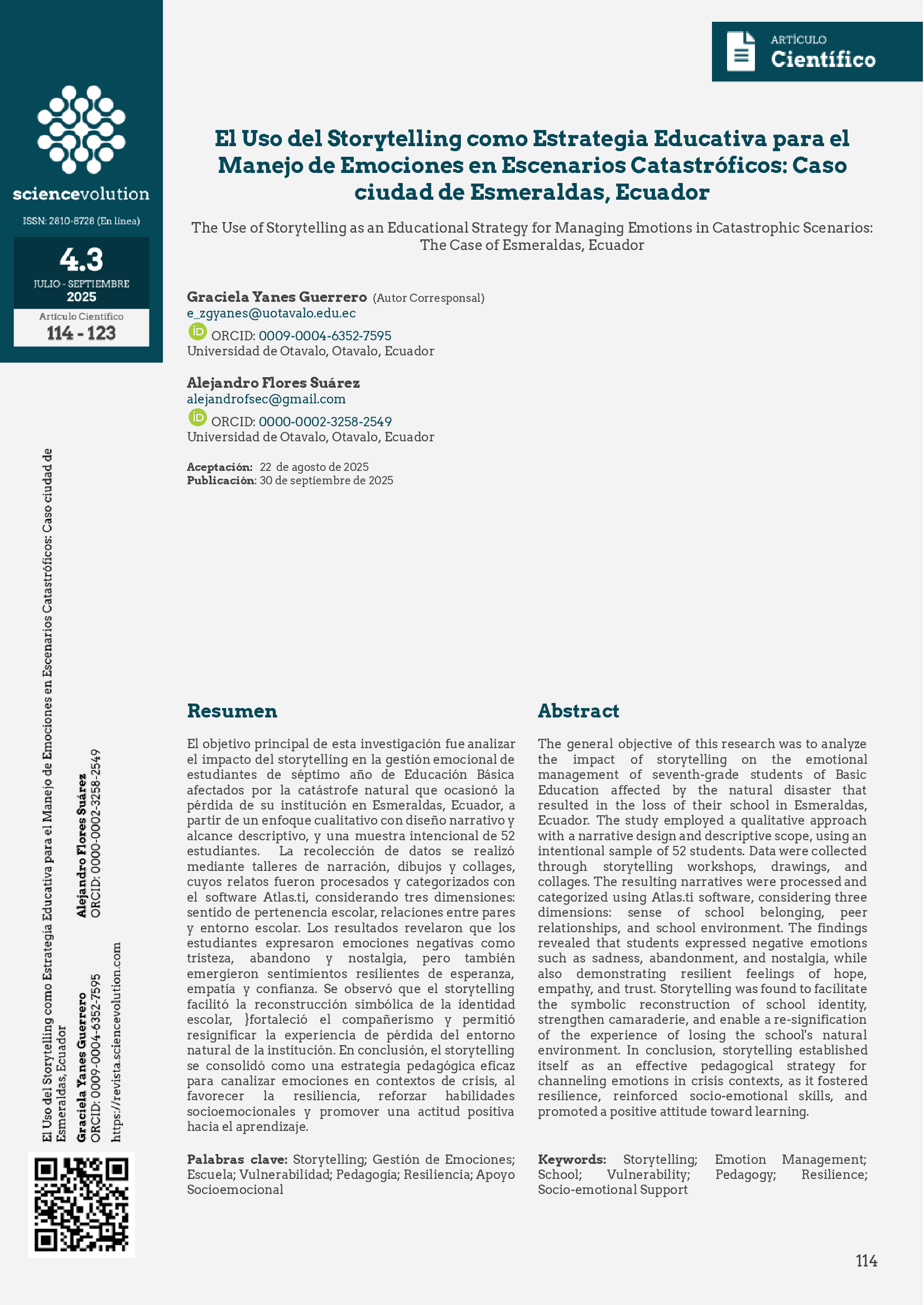Abstract
The general objective of this research was to analyze the impact of storytelling on the emotional management of seventh-grade students of Basic Education affected by the natural disaster that resulted in the loss of their school in Esmeraldas, Ecuador. The study employed a qualitative approach with a narrative design and descriptive scope, using an intentional sample of 52 students. Data were collected through storytelling workshops, drawings, and collages. The resulting narratives were processed and categorized using Atlas.ti software, considering three dimensions: sense of school belonging, peer relationships, and school environment. The findings revealed that students expressed negative emotions such as sadness, abandonment, and nostalgia, while also demonstrating resilient feelings of hope, empathy, and trust. Storytelling was found to facilitate the symbolic reconstruction of school identity, strengthen camaraderie, and enable a re-signification of the experience of losing the school's natural environment. In conclusion, storytelling established itself as an effective pedagogical strategy for channeling emotions in crisis contexts, as it fostered resilience, reinforced socio-emotional skills, and promoted a positive attitude toward learning.
References
Alcaldía Ciudadana de Esmeraldas. (s. f.). CCPD-E en seguimiento de caso Unidad Educativa Laura Mosquera. https://www.esmeraldas.gob.ec/noticias/item/1027-ccpd-e-en-seguimiento-de-caso-unidad-educativa-laura-mosquera.html
Barrios Cedeño, M. I., Moreira Quiroz, A. M., Vera Pérez, P. B., & Marcillo Solorzano, E. V. (2025). Educación en contextos de crisis: Revisión sistemática sobre desafíos y estrategias de respuesta en América Latina. Revista Alcon, 5(3). https://doi.org/10.62305/alcon.v5i3.583
Bastidas Cabrera, C. F., Aldaz Punina, M. B., & Cambo Yugsi, L. J. (2024). Storytelling como estrategia educativa motivacional para mejorar la comprensión lectora en básica media: Storytelling as a motivational educational strategy to improve reading comprehension in middle school. LATAM Revista Latinoamericana de Ciencias Sociales y Humanidades, 5(5), 1795–1805. https://doi.org/10.56712/latam.v5i5.2720
Çağlar Özhan, Ş., & Altun, A. (2020). The cognitive-emotional processes and their implications for teacher education research. Journal of Psychological and Educational Research, 28(2), 55–74. https://www.researchgate.net/publication/346099777_THE_COGNITIVE-EMOTIONAL_PROCESSES_AND_THEIR_IMPLICATIONS_FOR_TEACHER_EDUCATION_RESEARCH
Chawla, L. (2020). Childhood nature connection and constructive hope: A review of research on connecting with nature and coping with environmental loss. People and Nature, 2(3), 636–659. https://doi.org/10.1002/pan3.10128
Choo, Y. B., Abdullah, T., & Mohd Nawi, A. (2020). Digital storytelling vs. oral storytelling: An analysis of the art of telling stories now and then. Universal Journal of Educational Research, 8(5A), 46–50. https://doi.org/10.13189/ujer.2020.081907
Clandinin, D. J. (2013). Engaging in narrative inquiry (1st ed.). Routledge. https://doi.org/10.4324/9781315429618
CEPAL & UNESCO. (2020). La educación en tiempos de la pandemia de COVID-19 [Informe especial]. https://hdl.handle.net/11362/45904
De la Cruz Naranjo Grisales, F., & Rúas Amaya, Y. A. (2020). Storytelling como herramienta educativa. Documentos de Trabajo Areandina, 2, 1–18. https://doi.org/10.33132/26654644.1878
Erdogan, E. (2021). The impact of digital storytelling on the academic achievement and democratic attitude of primary school students. Educational Policy Analysis and Strategic Research, 16(1), 427–448. https://doi.org/10.29329/epasr.2020.334.22
Flick, U. (2018). An introduction to qualitative research (6th ed.). SAGE.
Hofman-Bergholm, M. (2022). Storytelling as an educational tool in sustainable education. Sustainability, 14(5), 2946. https://doi.org/10.3390/su14052946
Johnson, J. L., Adkins, D., & Chauvin, S. (2020). A review of the quality indicators of rigor in qualitative research. American Journal of Pharmaceutical Education, 84(1), 7120. https://doi.org/10.5688/ajpe7120
Khan, S. A., Poletti, G., Khan, F. N., & Hussain, S. (2025). Digital storytelling: A pedagogical approach to enhance young learners’ social-emotional skills. Review of Education, Administration and Law (REAL), 8(2). https://doi.org/10.47067/real.v8i2.421
Kim, D., & Li, M. (2021). Digital storytelling: Facilitating learning and identity development. Educational Technology Research and Development, 8, 33–61. https://doi.org/10.1007/s40692-020-00170-9
Kiviranta, L., Lindfors, E., Rönkkö, M.-L., & Luukka, E. (2024). Outdoor learning in early childhood education: Exploring benefits and challenges. Educational Philosophy and Theory, 66(1), 102–119. https://doi.org/10.1080/00131881.2023.2285762
La Hora, Ecuador. (2023). Siete escuelas están destruidas. La Hora. https://issuu.com/la_hora/docs/santodomingo13junio2023/8
Maggi, M. F., & Hendel, V. (2022). Relaciones intra e intergeneracionales de jóvenes en movimiento con familias migrantes (Argentina). Revista Latinoamericana de Ciencias Sociales, Niñez y Juventud, 20(3), 1–20. https://doi.org/10.11600/rlcsnj.20.3.4811
Mendoza Hidrovo, M. E., & Acosta, A. H. (2023). Storytelling una herramienta digital en el ámbito educativo: Revisión sistemática en el contexto suramericano. Polo del Conocimiento, 8(3), 523-539. https://polodelconocimiento.com/ojs/index.php/es/article/view/5317/13021
Merino Luzón, D. M. (2025). Storytelling en estudiantes de educación básica: Revisión sistemática. Tribunal. Revista en Ciencias de la Educación y Ciencias Jurídicas, 5(12). https://doi.org/10.59659/revistatribunal.v5i12.229
Moreira-Chóez, J. S. (2021). Narrativas digitales como didáctica educativa. Polo del Conocimiento, 6(3), 1–15. https://polodelconocimiento.com/ojs/index.php/es/article/view/2409
Pereñíguez, M. D., Palacios, J., Echevarría, P., Morales-Moreno, I., & Muñoz, A. (2025). The use of narratives as a therapeutic tool among Latin American immigrant women: Processes of reconstruction and empowerment in contexts of vulnerability. Healthcare, 13(4), 362. https://doi.org/10.3390/healthcare13040362
Riessman, C. K. (2022). Narrative methods for the human sciences (2nd ed.). SAGE.
Ruz López, D., Mercado, A. A., Perazzo, K. C., Balbuena, J., & Guerra Pallqui, R. N. (2025). Bienestar y educación: Una revisión narrativa. Revista Científica Arbitrada de la Fundación MenteClara, 10(0). https://dialnet.unirioja.es/servlet/articulo?codigo=10085456
Saraví, G. A. (2022). Pertenencia escolar y subjetividad en adolescentes de sectores populares. Perfiles Educativos, 44(177), 8–25. https://doi.org/10.22201/iisue.24486167e.2022.177.60510
Save the Children. (2024). Efecto en la salud mental de los niños, niñas y adolescentes en contextos de crisis y desastres [Informe]. https://www.savethechildren.es/sites/default/files/2024-11/Efecto_en_la_salud_mental_de_NNA_en_contextos_de_crisis_y_desastres.pdf
Servicio Nacional de Gestión de Riesgos y Emergencias. (2021). Informe de Situación – Época lluviosa. Informe N.º 49 [Informe]. https://www.gestionderiesgos.gob.ec/wp-content/uploads/2021/05/Informe-de-Situacion-No-49-Epoca-Lluviosa-febrero_05052021.pdf
Sokol, R. L., Heinze, J., Doan, J., Normand, M., Grodzinski, A., Pomerantz, N., Scott, B. A., Gaswirth, M., & Zimmerman, M. (2021). Crisis interventions in schools: A systematic review. Journal of School Violence, 20(2), 241–260. https://doi.org/10.1080/15388220.2021.1879098
Tanaka, E., Iso, H., Tsutsumi, A., Kameoka, S., You, Y., & Kato, H. (2020). School-based psychoeducation and storytelling: Associations with long-term mental health in adolescent survivors of the Wenchuan earthquake. Epidemiology and Psychiatric Sciences, 29, e65. https://doi.org/10.1017/S2045796019000611
UNESCO. (s. f.). La educación en situaciones de crisis. https://www.unesco.org/es/emergencies/education
Villalobos-Saldivia, I., Espinoza-Soto, A., & Fernández-Droguett, R. (2023). Escuela y educación en contextos de desastres socionaturales biológicos: Una revisión sistemática necesaria. Estudios Pedagógicos, 49(3), 437–458. https://doi.org/10.4067/S0718-07052023000400437
Yang, Y.-T. C., & Wu, W.-C. I. (2012). Digital storytelling for enhancing student academic achievement, critical thinking, and learning motivation: A year-long experimental study. Computers & Education, 59(2), 339–352. https://doi.org/10.1016/j.compedu.2011.12.012

This work is licensed under a Creative Commons Attribution-NonCommercial-NoDerivatives 4.0 International License.

